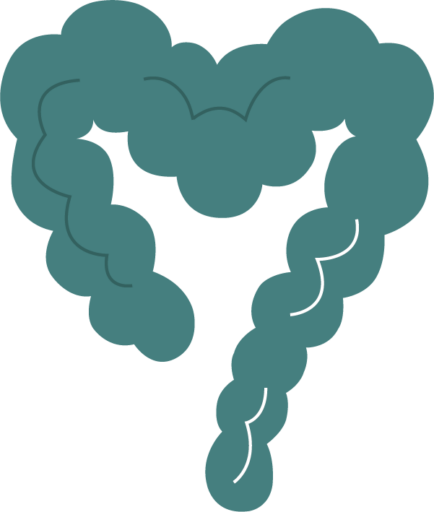
IBS and gut flora
How quickly can you change the gut flora? Is there an optimal gut flora, and what role does it play in the development of IBS? Many people wonder, but the answers are still not entirely clear. Here, we summarize what is currently known about the connection between gut flora and IBS.
We have over 1 kg of gut bacteria from about 400-1000 different strains, primarily in the large intestine. When counting the number of genes, we have significantly more DNA from the gut bacteria than from our own genes. Collectively, the bacteria in the gut are referred to as gut flora or microbiota. The bacteria can be both beneficial and harmful. Disease-causing bacteria are referred to as pathogenic and exist to some extent in the gut. Since gut bacteria live in symbiosis with each other, a balance is maintained between good and bad bacteria. However, if an imbalance occurs, harmful bacteria can proliferate and take over in the gut.
Gut bacteria have important functions, including:
- Producing vitamins, such as vitamin B12.
- Producing butyrate, which is essential for a healthy intestinal lining.
- Producing serotonin, our anti-depressant hormone.
- Protecting against infections from pathogenic bacteria.
- Communicating and assisting the immune system in protecting the body against intruders.
Currently, there is significant research on the connection between the gut and the brain, also known as the gut-brain axis. Many new discoveries are being made regarding how the connection between the gut and the brain affects our health. Functional gastrointestinal disorders, such as IBS, are not psychological illnesses, but it is important to understand that the brain plays a significant role because it constantly communicates with microorganisms in the gut.
Thanks to technological advances, we can now extract DNA from a stool sample and sequence it, which can provide answers about which bacteria are present, in what quantities, and in which sample.
Do gut bacteria play a role in IBS?
There is evidence supporting that disturbances or imbalances in gut flora can play a role in the onset of IBS in some cases. In summary, the following evidence from studies exists:
- The use of antibiotics is a well-known factor contributing to an imbalance in gut flora, which may increase the risk of developing IBS.
- Up to 25% of all IBS cases occur after an episode of gastrointestinal illness or infection of some kind. This is referred to as PI-IBS (Post-Infectious IBS).
- Low-grade inflammation may be present in the intestinal wall of individuals with IBS, which could be due to an abnormal interaction between gut bacteria.
- Small intestinal bacterial overgrowth (SIBO) involves a bacterial overgrowth in the small intestine, which can cause IBS symptoms. The connection to IBS remains to be verified.
- Modifying gut bacteria, through antibiotics or probiotics, can either improve or worsen IBS symptoms.
- Levels of bifidobacteria in individuals with IBS have been found to be lower than in healthy individuals.
A specific ‘gut flora signature’ consisting of 90 bacteria has been identified, differentiating patients with severe symptoms from healthy individuals. This gut flora exhibited low diversity, reduced production of methane, and a low concentration of methane-producing bacteria. The degree of altered gut flora, dysbiosis, has also been shown to affect how one responds to FODMAPs. The greater the degree of dysbiosis, the poorer the response to FODMAP .
Belly Balance digital treatment
Which type of gut bacteria is most important when having IBS?
Since individuals with IBS have been found to have a lower prevalence of bifidobacteria, and since the FODMAP diet itself has also been shown to reduce the amount of bifidobacteria, we usually start there. The probiotic Alflorex contains bifidobacteria and is well-studied for IBS with positive results. It is also recommended by the WGO (World Gastroenterology Organization) and can be taken for 4-8 weeks before evaluating its effects.
Does your diet affect the gut flora?
Can you influence your intestinal flora with your diet? Absolutely, it is possible to change the composition of gut bacteria. Studies show that a high-fiber diet over 6 weeks resulted in a 30% increase in diversity among gut bacteria. It’s important to think long-term and to increase fiber intake gradually. Additionally, it’s crucial to choose the right types of fiber when you have a sensitive stomach. To boost the production of butyrate in the gut, resistant starch is key, so always keep cooked potatoes in the fridge.
Sofia Antonsson
Reg. Dietitian, Belly Balance
Read more about

IBS - What is it?
Bloated , constipated or having a gassy stomach? IBS or Irritable Bowel Syndrome is a functional gastrointestinal disorder, meaning no physical issues can be found in the stomach or intestines; they just don’t function quite as they should.

How the app works
Download the app and become part of our community. We assist you in achieving a calm and happy stomach through treatment and tools available directly in the app.

About FODMAP
By learning which foods upset your stomach, you can make conscious choices and get quick symptom relief. With the low FODMAP diet, you receive structured assistance in understanding which foods your body tolerates better than others. No more guessing and pondering – you get the answer straight away!

